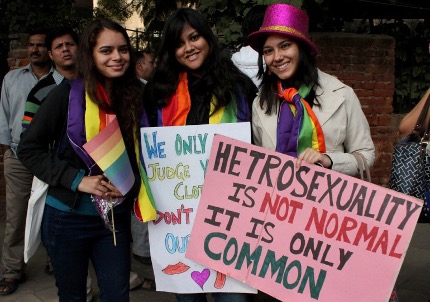The Government’s case against legalizing same-sex marriage in India is weak. Here’s why.


In 2018, the Supreme Court of India decriminalized consensual and private same-sex relationships in Navtej Singh Johar v. Union of India- – a landmark judgment that overturned the Supreme Court’s own ruling in Suresh Kumar Koushal v. Naz Foundation which upheld the now notorious Section 377 of the Indian Penal Code. Even though the Navtej judgment was momentous, it was merely the first step in the long fight for LGBTQIA+ equality- a step that should never have taken the Indian courts so long in the first place.
But even after Navtej, the journey for LGBTQIA+ acceptance has not been easy in India, especially for those living in small towns and rural areas. A lack of LGBTQIA+ friendly-spaces and radio silence on the issue of sexuality and gender identity has made it difficult for not only society to accept the LGBTQIA+ community, but also for LGBTQIA+ people to come to terms with their own identities. But in spite of these challenges, LGBTQIA+ activists across the country have continued to work tirelessly to change laws and mindsets alike. Back in 2017 (even before Navtej), Opposition party politician Dr. Shashi Tharoor tabled an anti-discrimination and Equality Bill in the Indian Lok Sabha that is comparable to the Biden Administration’s recently introduced Equality Act. However, unlike Biden, Tharoor wasn’t able to pass his Bill, ostensibly because of its radically transformative nature.
More recently, the BJP-led Central Government slammed efforts to legalize same-sex marriage in India by responding rather acerbically to three separate petitions seeking to secure these very same rights. The Government stated same-sex couples in India did not have the fundamental right to marriage because the Navtej judgment merely decriminalized ‘a particular human behavior’. Rather, the Government said, marriage in India should remain restricted to ‘biological men and biological women’.
The Government’s counter-affidavit also claimed that “Western ideas cannot be imported to the Indian context”; yet failed to prove how the idea of same-sex marriage was inherently ‘Western’. In fact, the terminologies of “western”, and “eastern” themselves are contested and require significant academic deconstruction. To merely claim that something is “western” or “eastern” is indeed a sign of intellectual laziness. The Government’s argument falls apart further when one considers the curious cases of two Asian, non-Western countries– Taiwan and Thailand. Taiwan not only legalized same-sex marriage back in 2019 but is now on track to legally recognize international same-sex marriages . Thailand is also considering expanding the scope of marriage to also include same-sex relationships. Moreover, rich historical and sociological evidence of the existence of same-sex marriage in India has been well-documented by scholar Ruth Vanita in her 2005 book Love’s Rite: Same-Sex Marriage in India and the West. This affirms that there is nothing quintessentially ‘western’ about same-sex marriage in India.

Two more of the Central Government’s arguments are grossly egregious. The first has to do with the Government’s labelling of sexual orientation as a “particular human behaviour” and the second is the Government’s idea of marriage as constitutive of a union between only ‘biological’ men and women. If we consider the first argument, we see that the Government’s line of reasoning is false because sexual orientation is not a behaviour, it is an integral aspect of one’s identity. Here is an excerpt from the Navtej judgment that drives this point home: “Sexual orientation is immutable, since it is an innate feature of one’s identity, and cannot be changed at will. The choice of LGBT persons to enter into intimate sexual relations with persons of the same sex is an exercise of their personal choice, and an expression of their autonomy and self-determination.” So, if one’s orientation is indeed intrinsic to one’s being and concomitantly, can’t be changed, then why should homosexuals be denied the same legal rights that their heterosexual counterparts enjoy- which includes the legal recognition of marriage? Ironically, arguments of ‘behaviour and choice’ are never made against heterosexuals because they constitute the majority in society, so much so that their sexual orientation is not only seen as the de facto ‘normal but also codified in multiple personal laws in the country that recognize various forms of opposite-sex unions. Yet, not a single law in India exists that recognizes LGBTQIA+ unions.
I wonder whether it is even morally justified for a country that prides itself (no pun intended) in the diversity and the multiplicity of its people, to deny a large section of these very same people equal rights?
The Government also claims that marriage can only be between a “biological man” and a “biological woman”, yet fails to define what a ‘biological woman’ is. In 2019, the Madras High Court ruled that the meaning of the word ‘bride’ in Section 5 of the Hindu Marriage Act “cannot have a static or immutable meaning”. Rather, it had to be expanded to include not just biological women, but also Transwomen, Transgender people, and intersex people. The Court further opined that the Constitution was a living document that needed to evolve with changing times in order to be relevant; furthermore, in Shafin Jahan v. Asikan K.M., (2018) it was already decided that “the right to marry a person of one’s choice is integral to Article 21 of the Constitution”. Why then, were these progressive arguments not made to grant equal rights to same-sex couples? Expanding the scope of marriage to same-sex couples does not take away anyone else’s rights. Rather, it makes for a more inclusive and diverse family unit. For a community that routinely experiences stigma, discrimination, and ostracization in Indian society, legalizing same-sex marriage would have been one way of rectifying historical wrongs. To argue that same-sex marriages could somehow cause “complete havoc with the delicate balance of personal laws in the country” (as the Government has also stated in its counter-affidavit) is gaslighting, plain and simple.
It isn’t surprising that valiant displays of compassion, courage, and love still threaten the small-minded and cold-hearted.

Well argued, keep up the good work
Stay blessed